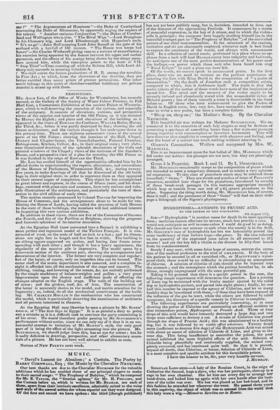MUSIC.
"David's Lament for Absalom ;" a Cantata. The Poetry by BARRY CORNWALL, Esq. ; the Music by the Chevalier NEITHOM111.
Our best thanks are due to the Chevalier NEUROBIPS for the valuable additions which he has enabled three of our principal singers to make to their sacred songs: "The Prophecy of Babylon," which he composed for Mr. E. TAYLOR, the ‘4 Gratias agimns," for Mr. H. Panzees, and the Cantata before us, which is written for Mr. BRAHAM, are each of them, apart from their intrinsic excellence, admirably suited to the voice sod-style of the several artists for whose especial use they were designed. Of the first and second we have spoken : the third (though published) has not yet been publicly sung, but is, doubtless, intended to form one of the features of the approaching Festivals. It commences by a strain of mournful expression, in the key of A minor, and in which the violon- cello is principal ; the composer here happily availing himself (as in the beautiful trumpet part to "The Prophecy of Babylon ") of the unrivalled powers of our chief instrumentalists. In the structure of the cantata,. recitative and air are alternately employed, wherever each is best fitted to express the sentiment of the words, and always with consummate skill. In a selection of sacred music, performed in a place where no ap- plause from a mob will lead BRAHAM astray into vulgarity and bad taste, we anticipate one of the most perfect demonstrations of his power over the feelings,—a power which those only who have heard him sing " Total Eclipse" in such a place can have felt.
Of the words, we cannot speak in unmeasured praise. In the first place, there was no need to venture on the perilous experiment of entering the lists with King David in the composition of " a psalm of lamentation." On the death of Jonathan such a composition exists, compared to which, this is feebleness itself. The truth is, that the poetic talents of the author of these words have none f the inspiration of sacred fire. The mind and the memory of the writer ought to be strongly imbued and abundantly stored with the unspeakable riches of Hebrew poetry; but of these scarcely a trace is discoverable in the lines before us. Of those who have endeavoured to give the Psalms of David in English verse, few, very few, have succeeded ; but the endea- vour to write a new psalm, has been a complete failure.


























 Previous page
Previous page